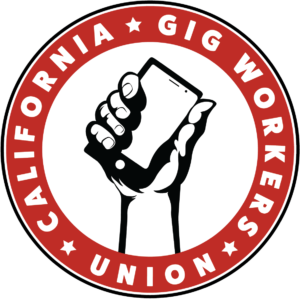According to a recent survey commissioned by GOBankingRates, over 46% of Americans take on a side hustle to cover their monthly budget. Adding a second job (a.k.a. “freelancing” or “side hustle”) helps 50% of survey respondents to make enough money just to cover expenses. If the economy is so strong, why are so many people taking on a side gig to make ends meet?
For Press
Media inquiries? Call Tim Sandoval at 213-218-5855.
Finding a job in the US is pretty easy these days. Finding a good one isn’t. And the gig economy is partly to blame. The gigeconomy — that is, workers who get paid per task, sale, or project — is creating extreme financial hardship for millions of American workers, even as the overall economy continues to expand.
Around 100 rideshare drivers protested their working conditions this afternoon in Los Angeles, engaging in a “take over” of an Uber Hub, before joining up with a contingent of fast food workers from McDonald’s who were striking for the right to unionize. The group behind the protest, the recently minted Mobile Workers Alliance (MWA), is associated with the Service Employees International Union (SEIU) local 721. To our knowledge, this marks the first time rideshare drivers and members of Fight For $15—a grassroots movement agitating for fair wages among food service workers—have taken joint action.
orkplace protections and the right to organize through unions. Tomorrow, Lyft and Uber drivers will convene outside Uber’s San Francisco headquarters to make their voices heard. As established in Dynamex Operations West, Inc. v Superior Court of Los Angeles, AB-5 seeks to codify the ruling. In that case, the court decided Dynamex wrongfully classified its workers as independent contractors. AB-5, which has already passed in the California State Assembly, would ensure gig economy workers are entitled to minimum wage, workers’ compensation and other benefits.
abor protections and the right to join together turn their jobs into good, family-sustaining ones and win a voice at work. Driving for Uber, I’ve seen first hand how app-based services, like Uber and Lyft, have given riders unprecedented convenience and a way to save time, one of our most valued commodities. I often get comments from my riders about how grateful they are for being able to focus on something they would rather focus on, by having someone like me get them quickly and safely to where they need to go.
fternoon with another victory in what is and is likely to continue to be a long and ugly fight. First introduced to the state assembly in January as Assembly Bill 5 (AB5) by Rep. Lorena Gonzalez, the bill codifies and expands a landmark state supreme court ruling from last May which wrestled with the same employment classification issue. In determining whether a worker is a true independent contractor (as Uber, Lyft, and other “gig economy” platforms contend) or employees, there are a number of legal tests that, in simple terms, suss out whether the laborer has sufficient say in how and when the work is completed.
